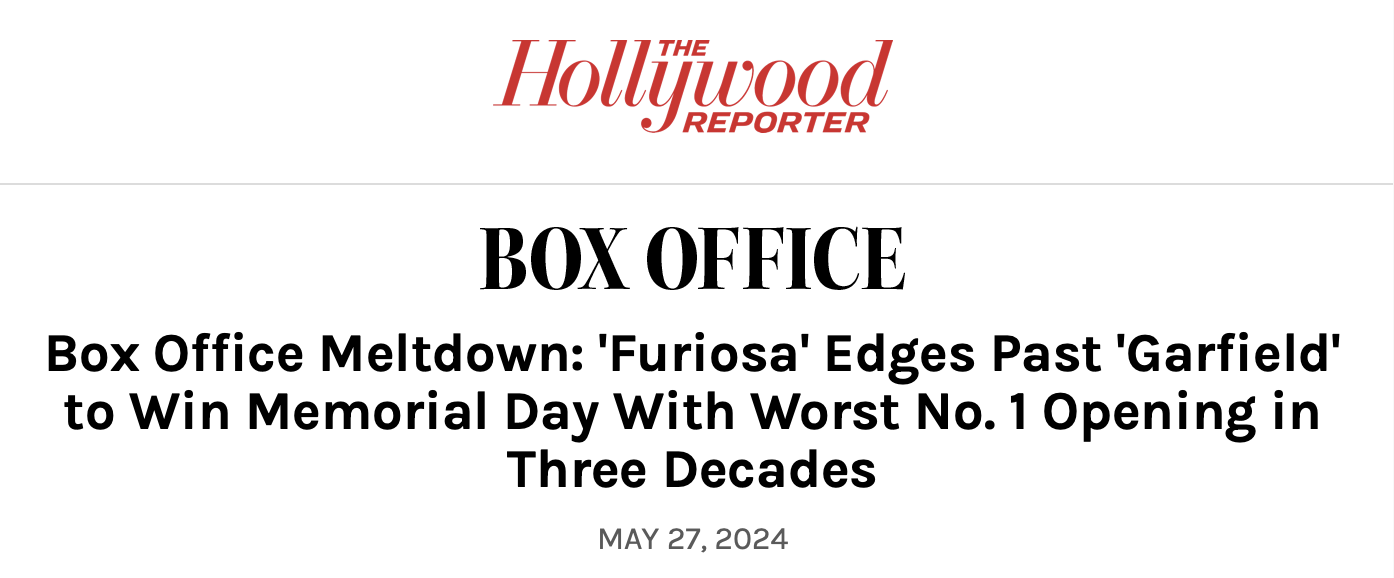Rethinking the Viability of the Big Budget Blockbuster in the Algorithmic Age
I came across this post in a filmmaker Facebook Group that linked one of the many headlines categorizing the performance of the new Mad Max franchise installment ‘Furiosa’ as an opening weekend failure.
The ‘trades’ (film industry-oriented publications) lament the sluggish summer box office and wax poetic over when the season will finally “heat up” and see openings closer to $100m like the good ole days.
The media is dumping so hard on Furiosa amidst a completely unprecedented market that’s still not “recovered” from a global pandemic, industry-halting strikes, and the streaming shrink.
“The movies” always had to sell themselves to consumers using exciting trailers, tabloid fodder, exclusive merchandise, and whatever gimmick they could employ to get audiences engaged enough to make the trek to the cinema for the night-out experience.
Many just don’t have the funds to go to the movies the way they used to, nor can they see the value beyond the hassle. The pandemic reset our routines over a two-year period, cozying up our movie rituals with convenient snacks, infinite luxury to pause, and plenty of second, third, and follow-up choices if the thing we want isn’t unavailable.
Now, even if a movie is fantastic, it’s tough to compete for target audiences’ attention in the algorithmic landscape without a truly epic (and engaging) cross-platform marketing effort. And, it’s clear that this year’s ‘tentpoles’ aren’t yet up to the task.
Not all projects have a Margot Robbie-type star who is also an engaged producer who sees movie marketing as part of the entertainment (and, therefore, a fun part of their job). Barbie was among the minority of $100m+ budget films to turn a meaningful profit (that the market can quantify outside the streaming data wormhole) in the past few years, and its counterpart Oppenheimer was, in my opinion, in the right place at the right time. The Barbenheimer summer wasn’t a sign of market recovery; it was a foretelling of the Big-Budget Blockbuster’s uncertain future.
Though focused on an extreme example, the Algorithmic Radicalization of Taylor Swift presents an interesting explanation of how a pop culture topic can become a market behemoth when audiences engage continuously across multiple platforms. Our actions are tracked across apps, search engines, newsletter subscriptions, GPS, and so much more, and how we engage with each topic we encounter factors into the future content we’ll be served. When one topic with multiple successive (and successful) threads captures enough action over a wide enough social sprawl for a long enough period of time, it saturates the algorithm and starts to drown smaller topics, achieving a degree of algorithmic supremacy.
Anyone But You, the rom-com that took Winter 2023/2024 by storm, was helmed by two producer-minded stars who were both highly engaged in the public eye (Sydney Sweeney and Glen Powell) and in savvy marketing tactics that catapulted the film into the global conversation. A well-timed staggered release captured marketing momentum and a many-multiples return on the film’s reasonable $25m budget.
To answer the Facebook Group question posed above, “what kind of summer blockbuster would take u to the cinema?” I’ll preface with the fact that I’m not the ‘target market’ of a summer blockbuster. Most of us in that Facebook Group go to the movies anyway, far more often, and for different reasons than the traditional consumer. But, with respect to what has worked for true ‘blockbuster’ films in the past couple of years (which, I repeat, are completely unprecedented in an industry that’s never been more fractured and financially unstable) —
I’ll be interested to see how Deadpool & Wolverine performs midsummer, not just because of the timing (July 26 captures summer audiences without the immediate performance pressure), but also on the heels of an engaging, brand-ballooning marketing effort that has been steeping superfans and sopping up curious bystanders for months, myself included.
Movies that survive (and thrive) in this rapidly evolving box office climate have to catch fire in what might be the most saturated environment in the history of entertainment. Algorithmic supremacy seems to be one of the few fuels that can power a blockbuster’s big budgets to (market) victory.



